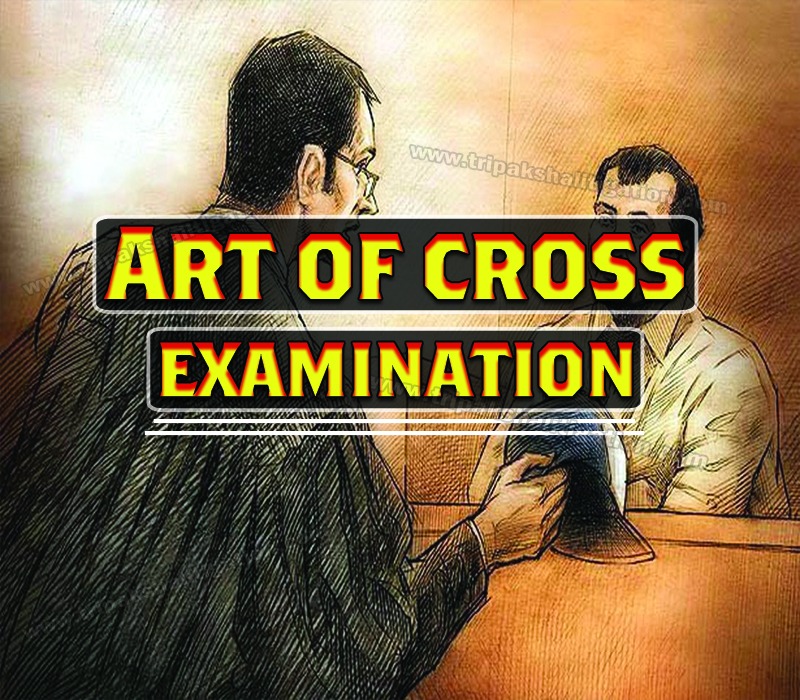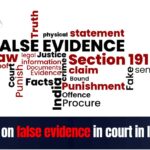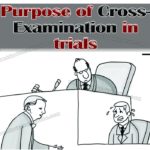“Cross-examination, the rarest, the most useful, and the most difficult to be acquired of all the accomplishments of the advocate…. It has always been deemed the surest test of truth and a better security than the oath.” – Cox
Cross-examination is one of greatest modern weapons for testing the veracity of a statement made by a person. It is both (A) a sword of attack and (B) a shield of defense. He who kmows the art of cross-examination knows the art of advocacy he knows the art of cross-examination shall always attract a crowd of client.
SOONAWALA’s Advocacy.
(Principle and Practice.)1953
Introduction:
A Cross examination is defined as the method that lawyers use to get information from a witness. The information that the witness gives is testimony, during a cross examination.
DEFINITION of Cross-Examination:
Marriam Webster (Dictionary): the examination of a witness who has already testified in order to check or discredit the witness’s testimony, knowledge, or credibility.
The Oxford (Dictionary): the formal interrogation of a witness called by the other party in a court of law to challenge or extend testimony already given.
The American Business Journal defines Cross-examination as the methodology to ask someone detailed questions, especially in a law court, in order to discover if what they said earlier was true or not.
What is Cross-examination?
Cross-Examination is the process whereby a party who appears in court asks the opposing witness’ party questions to ascertain the veracity of his claims. This is questions that a lawyer directs to a witness of an opposing party with the intention of getting privileged information from such witness. Cross-Examination is an important tool during a legal tussle in a court of competent jurisdiction owing to the fact that is one of the viable means through which the truth can be separated from falsehood. Cross-Examination is more than the simple process of fielding a witness quality.
Cross-examination is an art form only occasionally practiced by prosecutors, who instead necessarily focus much of their efforts on direct examination. This is brought on by the prosecution bearing the burden of proof and the simple realities of many criminal trials where the defense may choose to present few or no witnesses. Cases, however, are often complex and more scientific or technical in nature than many other types of criminal cases. Accordingly, the prosecutor’s opportunity to conduct a cross-examination, particularly of an expert witness, is greater.
Cross-examination is a critical part of any trial. Never is this truer than when technical or scientific evidence is a central issue for adjudication. With this being said, prosecutors often feel uncomfortable during cross-examination of defense witnesses. This is not due to lack of ability. Rather, it is caused by insufficient practice, focus, and preparation for this part of the trial. As prosecutors, we generally expend most of our effort on “proving our case” in chief and experience a feeling of relief when the prosecution “rests.” In reality, the State’s case is far from over at the end of the State’s presentation of evidence.
The simple message is that case preparation includes preparing to overcome any defense theory because it is often when the State’s case ends that the most difficult work, cross-examination of the defense witnesses, begins. In order to succeed at cross-examination, a prosecutor must understand the goals of each party in a criminal trial. This allows a prosecutor not only to block the defense tactics, but also to use skillful questioning of defense witnesses to illicit responses favorable to the State. The goal of the defense during trial is to cast doubt in the mind on behalf of their client.
Objective of cross examination:
If the key to a successful direct examination is constructing a narrative, the key to cross-examination is deconstructing that narrative, and perhaps developing an alternative one. The goal of the cross-examining attorney (at least when he thinks his side has been disadvantaged by a witness’s testimony) is to highlight the artificiality of the narrative presented on direct examination, showing it to be selective and willful. And the style of cross-examination is calculated to achieve this goal. Here, where is it less likely that the witness will cooperate with the examiner’s project, the rules of evidence will permit counsel to proceed through leading questions, and he is apt to do so. Indeed, cross-examination will generally be done through a sequence of short questions that cannot plausibly be denied, and that are barely “questions” at all.
A lawyer conducting a good direct examination will often seem to fade into the background. On cross-examination, the lawyer takes center stage, sometimes even over-shadowing the witness. The effect is rarely, if ever, that depicted in the movies or on television, when the browbeaten witness collapses on the stand and admits having committed the crime himself. Nor must cross-examination be done in a loud voice, five inches from the witness’s face. Judges tend to protect witnesses against such abuse, and it is rarely a productive tactic anyway. Nevertheless, a good cross-examination can still be quite dramatic.
Keeping a tight rein on the witness through leading questions to which the witness can answer only “yes” or “no,” the good cross-examiner may use a variety of tactics to lessen or even reverse the impact of the witness’s direct examination. He may make the witness go back over some of the terrain covered during direct examination, forcing the witness to concede “facts” inconsistent with the previous narrative. He may confront the witness with statements the witness made before trial that are inconsistent with the witness’s direct testimony.. The judge will generally instruct that questions are not “evidence,” but that the jury can still consider the witness’s responses in the context of the questions. The difference between taking assertive questions as fact and taking them as mere “context” may seem small or nonexistent, particularly to a lay juror.
The general rule used to be that a party could not impeach the credibility of people it had called to the stand, the rationale being that a party had “vouched” for the credibility of those witnesses. Recent years have seen the rejection of this rule, however. Rule makers have generally come to recognize that parties may be forced to put on witnesses whose testimony is true only in certain parts, so far as the parties are concerned, and may need to impeach the witness on other parts.
Many would argue that the practical purpose of cross-examination is simply to undermine or destroy direct testimony. However, the legal purpose of cross-examination is a good faith quest for ascertaining truth and the prosecutor should use it justly and legitimately. Cross examination of fact witnesses will differ from that of expert witnesses but a prosecutor’s goals remain the same. Choosing the type and form of cross-examination, therefore, should be done in light of the State’s theory of the case and organized in such a manner as to reduce confusion and seek the truth.
There are four basic goals for a prosecutor to consider in the cross-examination of each defense witness:
- Obtain factual admissions helpful to the case.
- Corroborate the testimony of the witnesses.
- Minimize the defense case by impeachment of the witness on the stand.
- Minimize the defense case by impeachment of other defense witnesses through the witness on the stand.
Prosecutors should prepare a cross-examination for each witness in light of each of these goals. This is critical because the defendant’s witnesses may provide the last testimony heard by the jury prior to closing argument. However, the prosecutor can make use of cross-examination to ensure that some of that evidence either bolsters the case or undermines that offered by the defense, or, better yet, both. Cross-examination and its execution can be varied. Personal choices as to style and techniques will dictate how specific facts and specific witnesses are approached.
Scope of Cross-Examination:
Generally, a defense attorney may ask questions which are relevant to facts and/or biases that relate directly to the testimony of a particular witness. In some jurisdictions cross-examination may be limited to the scope of the prosecution’s direct examination.
The collateral facts rule permits the government to object when a defense attorney is cross-examining or impeaching a witness on issues that are collateral or irrelevant to the question of law or fact being argued. For example, if a witness is testifying as an eyewitness to a crime, the fact that they have not paid their taxes in the last few years would be irrelevant to the case. If a defense attorney attempted to discuss the issue on cross in an attempt to discredit the witness, a judge would likely rule that a witness’ taxes are irrelevant to the veracity of his eyewitness testimony.
Cross examination in Indian context:
The solemn aim of all justice delivery system universally is discovery and ascertainment of truth and truth alone. Cross examination is a vital feature of all modern system of evidence. It is most effective of all means and measures for extracting truth and exposing falsehood.
Cross-examination though is very powerful, effective and efficacious instrument, but experiences reveal that it has to be handled with all emotional intelligence available to its user. In fact it is doubled edged weapon. It often wounds him who wields it and flourished to whom it is aimed. Every Indian with a heavy heart feels that in India an impartial witness is rarely found. Further Indian society is divided into various segments on basics of religion, creed, castes, sub caste and race. Tendency of mixing innocent persons with wrong doers is also found here. This peculiar feature of Indian Justice System has further made the task of cross-examiner more onerous and complicated.
Provisions as to law of cross examination in India:
The relevant provisions as to cross-examination, which precedes examination in chief and which follows re-examination, may usefully be found in chapter X under title “Of the examination of witnesses” of the INDIAN EVIDENCE ACT, 1872.
This chapter X, which is the last chapter of the said ACT, consists of 33 sections spreading from section 135 to 166.
Cross –examination is not the only method to discredit a witness:
Cross-examination is not the only method of discrediting a witness. In case the oral testimony of certain witnesses is contrary to proved facts, their evidence might well be discarded on that ground. If their testimony is on the face of it, unacceptable, court is not bound to accept the same merely because there was no cross-examination.
The scheme of chapter X would primarily deal in:
- Examination of witnesses in chief.
- Their cross-examination.
- The method of impeaching the credit of witnesses.
- Judge’s power to put question or production.
“XXX’s Golden rule” the Conclusion
GOLDEN RULES FOR THE EXAMINATION OF WITNESSES as per David Paul Brown, a very able nisi prius lawyer of great experience at the Philadelphia Bar, many years ago condensed his experiences of cross-examination. If they are bold, and may injure your cause by pertness or forwardness, observe a gravity and ceremony of manner toward them which may be calculated to repress their assurance. If they are alarmed or diffident, and their thoughts are evidently scattered, commence your examination with matters of a familiar character, remotely connected with the subject of their alarm, or the matter in issue and when you have restored them to their composure, and the mind has regained its equilibrium, proceed to the more essential features of the case, being careful to be mild and distinct in your approaches.
If the evidence of your own witnesses be unfavorable to you (which should always be carefully guarded against), exhibit no want of composure; for there are many minds that form opinions of the nature or character of testimony chiefly from the effect which it may appear to produce upon the Counsel. If you perceive that the mind of the witness is imbued with prejudices against your client, hope but little from such a quarter unless there be some facts which are essential to your client’s protection, and which that witness alone can prove, either do not call him, or get rid of him as soon as possible.
Never call a witness whom your adversary will be compelled to call. This will afford you the privilege of cross examination, — take from your opponent the same privilege it thus gives to you, and, in addition thereto, not only render everything unfavorable said by the witness doubly operative against the party calling him, but also deprive that party of the power of counteracting the effect of the testimony.
Be not regardless, either, of the voice of the witness; next to the eye this is perhaps the best interpreter of his mind. The very design to screen conscience from crime the mental reservation of the witness is often manifested in the tone or accent or emphasis of the voice. There is no scope for further illustrations; but be watchful, I say, of the voice, and the principle may be easily applied. Be mild with the mild; shrewd with the crafty; confiding with the honest; merciful to the young, the frail, or the fearful; rough to the ruffian, and a thunderbolt to the liar. But in all this, never be unmindful of your own dignity. Bring to bear all the powers of your mind, not that you may shine, but that virtue may triumph, and your cause may prosper.
In a criminal, especially in a capital case, so long as your cause stands well, ask but few questions; and be certain never to ask any the answer to which, if against you, may destroy your client, unless you know the witness perfectly well, and know that his answer will be favorable equally well; or unless you be prepared with testimony to destroy him. An equivocal question is almost as much to be avoided and condemned as an equivocal answer; and it always leads to, or excuses, an equivocal answer. Singleness of purpose, clearly expressed, is the best trait in the examination of witnesses, whether they be honest or the reverse. Falsehood is not detected by cunning, but by the light of truth, or if by cunning, it is the cunning of the witness, and not of the Counsel.
Never undervalue your adversary, but stand steadily upon your guard; a random blow may be just as fatal as though it were directed by the most consummate skill; the negligence of one often cures, and sometimes renders effective, the blunders of another.
Fear not that your discreet reserve may be mistaken for carelessness or want of self-reliance. The true motive will soon be seen and approved. Your critics are lawyers, who know well the value of discretion in an advocate; and how indiscretion in cross-examination cannot be compensated by any amount of ability in other duties.
Effective cross-examination can make the difference between winning and losing a trial. Although cross-examination can be the part of trial that is the most fun for experienced trial lawyers, preparing good cross-examination takes a lot of thought and hard work.
You may contact me for consultation or advice by visiting Contact Us








